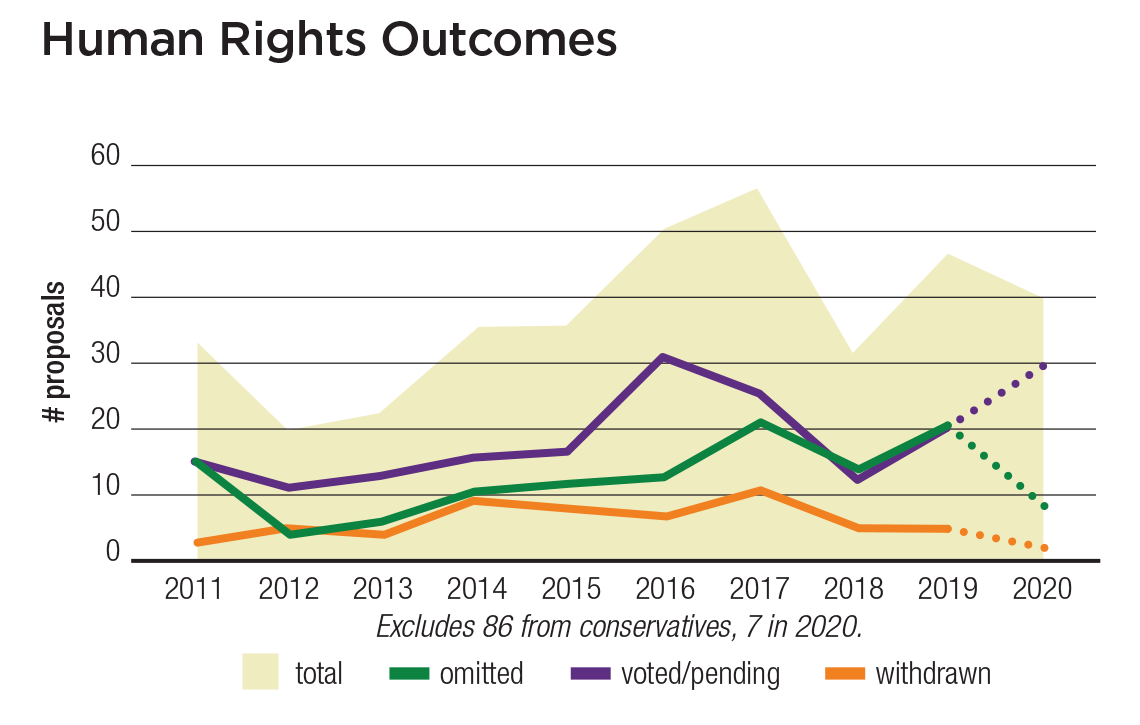Relatively general resolutions about company approaches to human rights abound this year. The largest group ask companies to report on how their human rights risk assessments are done, six more ask companies to adopt policies in the first place, and five seek reports on how current policies are implemented.
Risk assessments: The proponents want to know how companies assess their supply chains and operations for red flags:
At Broadcom, TJX and Kohl’s, the proposal
asks about the “process for identifying and
analyzing potential and actual human rights
risks of its operations and supply chain.”
Longstanding concerns exist about workers
in long global supply chains for textiles at the last two companies, the proponents note, while the issue at Broadcom is one of forced labor in the electronics sector, both in product assembly as well as from sourcing for raw materials like tin, tungsten, tantalum and gold (“conflict minerals”). The resolutions note low
scores for all three companies in reports from KnowTheChain and the Corporate Human Rights Benchmark and say current company policies and disclosures are insufficient.At three chicken processors—Pilgrim’s Pride, Sanderson Farms and Tyson Foods—the request is for a report on the “human rights due diligence (HRDD) process to assess, identify, prevent and mitigate actual and potential adverse human rights impacts.” Shareholder proponents have long been concerned about working conditions at chicken processors, highlighted in an Oxfam initiative called Lives on the Line.
In a similar vein, the Sisters of St. Francis of Philadelphia would like Chevron to “commission an independent third- party report...evaluating the effectiveness of Chevron’s efforts to prevent, mitigate and remedy actual and potential human rights impacts of its operations.” The proposal calls for information about community consultation and environmental justice—and notes the Sustainability Accounting Standards Board says these all are material concerns for the oil and gas industry. The proposal observes, “Emissions from the use of Chevron’s products and operations contribute to the climate crisis, which may compound impacts to already burdened communities,” giving examples about contamination near California refineries and controversy about cleanup in Ecuador. The proposal notes the company received zero points from the 2019 Corporate Human Rights Benchmark report grading how it is resolving problems.
Three of the risk assessment resolutions explicitly focus on products they call “high risk.” At Amazon.com, Oxfam America seeks an assessment “examining the actual and potential impacts of one or more high risk products sold by Amazon or its subsidiaries...throughout the supply chain.” The resolution says the company can focus on areas with known problems, such as the Southeast Asian shrimp industry, palm oil plantations in Malaysia and “rampant labor abuse among U.S. tomato producers.” The company’s ownership of Whole Foods and AmazonFresh make these issues particularly salient, Oxfam says.
Similarly, proponents want Lear and Northrop Grumman to report on examinations of “company’s high-risk business activities in its operations and value chain.” At Lear, the proposal mentions the automotive supply chain and its long raw materials supply chain in high-risk countries for sourcing of leather, assembly of seating, and also domestic health and safety issues. The proposal was prompted by a campaign from the Investor Advocates for Social Justice called “Shifting Gears.” At Northrop, the company’s heavy dependence on defense contracts is the issue, including its work using biometric data in its work on the Homeland Advanced Recognition Technology (HART) database; the proposal says the database will hold information on some 260 million people and poses risk to privacy, the First Amendment and immigrant communities. Longstanding concerns about the company’s weaponry also are at issue, including in its sales to Saudi Arabia given the war in Yemen.
Votes—Two of the resolutions to chicken processors have already come to votes. Shareholders gave the Sanderson Farms proposal 36.8 percent support on Feb. 13. Before that, the vote at Tyson Foods was 14.5 percent.
SEC action—Amazon.com is arguing the proposal is not significantly related to its business and concerns ordinary business but the SEC has yet to respond. (Last year the company successfully challenged a similar resolution and the SEC agreed it was ordinary business.) The proposal expresses concerns about potential use of child or forced labor in the company’s supply chain, for various commodities as well as shrimp in Southeast Asia.
Northrop Grumman is contending the resolution relates to ordinary business, and also that it is moot and too vague; the first two arguments reiterate an unsuccessful challenge by the company in 2019 on a similar human rights proposal that earned 31 percent support.
INVESTORS WANT AUTO INDUSTRY TO SHIFT GEARS ON HUMAN RIGHTS
MARY BETH GALLAGHER
Executive Director, Investor Advocates for Social Justice
GINA FALADA
Senior Program Associate, Investor Advocates for Social Justice
Accountability for corporate supply chain impacts is now before the courts as Tesla and five other companies face a class action lawsuit filed on behalf of 14 children and parents from the Democratic Republic of Congo (DRC) for allegedly “aiding and abetting in the death and serious injury of children who claim they were working in cobalt mines in their supply chain.” This risk faces all companies in the automotive industry, which relies on complex, extended supply chains to source the wide range of raw materials that go into the 30,000 different parts in a vehicle.
Withdrawal—Miller/Howard Investments withdrew at Broadcom after reaching an agreement.
Adopt and strengthen policies: Six proposals contend companies should adopt policies or strengthen the ones they already have. Five are quite similar, asking American Outdoor Brands, Carnival, First Horizon National, Nucor and Skechers U.S.A. to adopt policies that explain the companies’ approach to the “due diligence processes” that will “identify, assess, prevent and mitigate actual and potential adverse human rights impacts.” Another at Amazon.com is more detailed, asking it to adopt and
publicly disclose a comprehensive policy applicable to Amazon’s operations and subsidiaries that commits the company to respect human rights, including ensuring safe and healthy workplaces; prohibiting discrimination and retaliation; affirming the right of workers to form and join trade unions and bargain collectively; and describing the process the Company will use to identify, assess, prevent, mitigate, and, where appropriate, address adverse human rights impacts.
Withdrawal and SEC action—Two of the policy adoption proposals have been withdrawn. Mercy Investments and the Presbyterian Church (USA) withdrew after Carnival agreed to continued engagement as well as to “expand its existing policies and practices on human rights and develop a more strategic and holistic approach to these issues.” At First Horizon, the withdrawal came after a company challenge at the SEC that argued the resolution was moot, concerned ordinary business was not significantly related to the company. Discussing the withdrawal, the proponents report that the company has developed and made public its initial Human Rights Policy and Supplier Code of Conduct and agreed to dialogue with shareholders.
Reporting on implementation: Four out of five resolutions seeking information on how companies are implementing extant human rights policies are pending. Each is slightly different:
At Tesla Motors, the request is for information on “processes for embedding respect for human rights within operations and through business relationships.”
At Royal Caribbean and PPG Industries it is to describe “processes to implement the commitments” set out in company policies.
At General Motors, the proposal seeks a report “on GM’s systems to ensure effective implementation of its Human Rights Policy.”
A Kroger, Oxfam America wants to know about the company’s “human rights due diligence (HRDD) process to identify, assess, prevent and mitigate actual and potential adverse human rights impacts in its operations and supply chain.”
SEC action—PPG Industries persuaded the SEC the resolution is moot given current disclosures.




